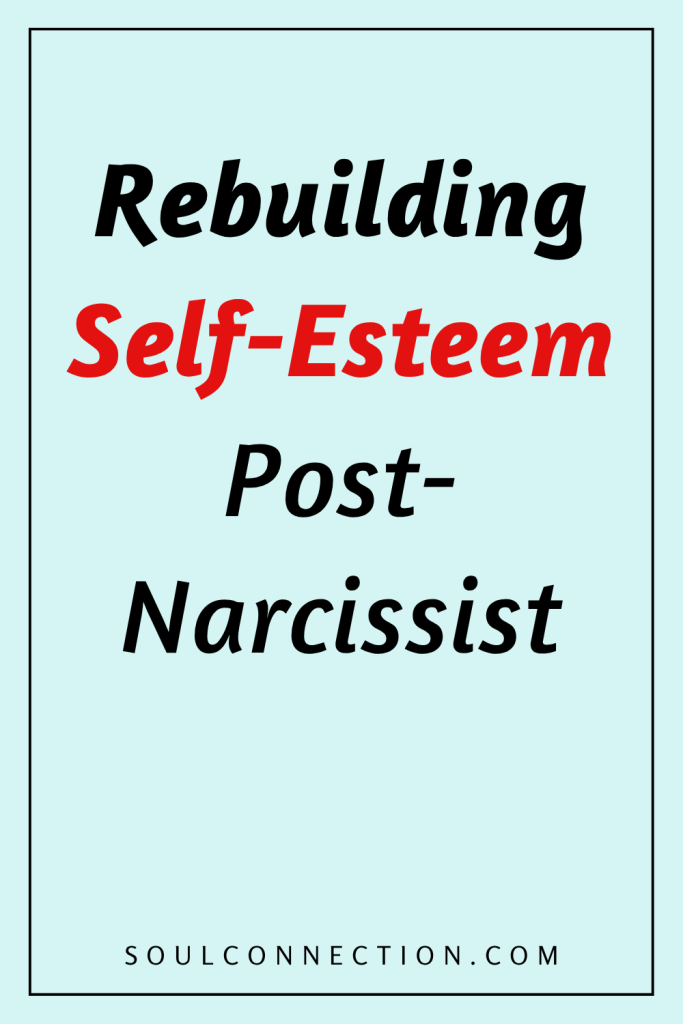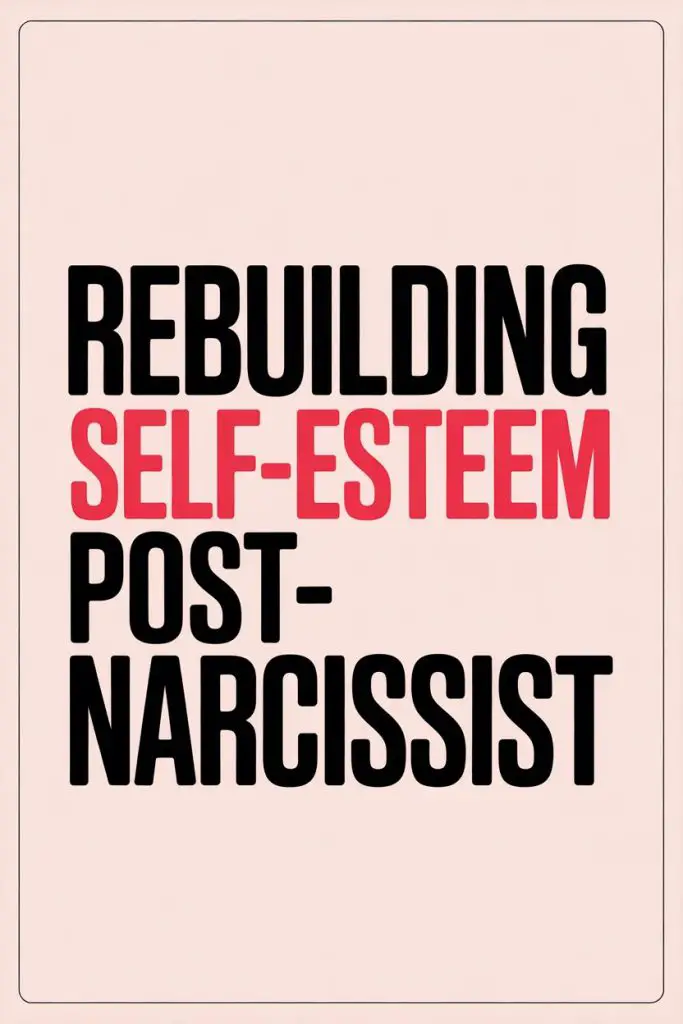Emerging from the clutches of a narcissistic relationship is a bit like stumbling out of a haunted house at dawn—spooked, disoriented, and clutching onto whatever scraps of confidence survived the night.
The ghosts of gaslighting, the poltergeists of put-downs, and the relentless creaks of self-doubt can linger for ages. Yet, somewhere inside, there’s a spark—your sense of self—flickering, stubborn, and ready to be rekindled.
Here’s how to dust off that spark and coax it into a roaring fire. Self-esteem after narcissistic abuse isn’t just possible; it’s your birthright, as indispensable as Wi-Fi and just as worth fighting for.
Recognising the Fallout
Self-esteem rarely survives a narcissist in mint condition.
These relationships often operate like a long-running con: “You’re not enough. You’re too much. You’re the problem.” After a while, these lines start to sound suspiciously true.
Before trying to fix anything, give yourself a moment to admit how much was taken. This isn’t wallowing—it’s honesty.
If you find yourself hesitating to speak up, doubting your memory, or scanning every text twice for “tone,” you’re not paranoid; you’re recovering.
Awareness is the first step because you can’t rebuild what you’re still pretending isn’t broken.
Giving Yourself the Gift of Anger
Politeness is overrated—at least when it comes to your own healing. That simmering anger, the one you’ve been told is “ugly” or “unattractive”? It’s a lifeline.
Anger is proof that a part of you knew something was wrong all along.
Let it crack open the numbness left by gaslighting. Write a scathing letter (then burn it if you must). Yell into a pillow. Take a boxing class. Channel that fire into action.
Anger can morph into courage, and courage is indispensable for getting your confidence back.
No More Apologising for Everything
Narcissists hand out guilt like it’s Halloween candy. “Sorry for breathing. Sorry for needing. Sorry for not mind-reading your every whim.” It’s exhausting.
Start noticing every time you apologise when you haven’t done a thing wrong. You might be shocked at how automatic it’s become.
Make it a game: catch yourself, and replace the apology with a different phrase. Maybe, “Thank you for waiting,” or just a dignified silence.
You’re allowed to take up space—literally and emotionally. No apologies required.
Relearning Your Own Voice
Narcissists are experts at silencing others. After all, one opinion in the room is quite enough (theirs).
If you start to worry your own thoughts and feelings are out of tune, remember: your lived experience is valid, no permission slip needed.
Try journaling for a few minutes each day—uncensored, unsupervised, no editing for politeness or palatability. Don’t worry if it doesn’t sound profound. Your voice, in all its messy glory, is more important than you think.
Share your thoughts with a trusted friend or therapist. Notice who listens, not just who hears. Safe spaces matter.
Setting Boundaries Without Guilt
Boundaries to a narcissist are like garlic to a vampire. Which is to say, absolutely necessary for your survival.
Begin with small, clear boundaries. “I’m not available to talk right now.” “I need this space to be just for me.” “I don’t want to discuss that.” You don’t owe anyone endless explanations.
Expect some pushback—especially from folks used to you bending over backwards. If someone sulks, throws a tantrum, or tries to guilt-trip you, consider it proof you’re onto something good.
Each time you hold a boundary, you’re telling yourself: “I matter.” That’s where real self-esteem grows.
Ditching the Inner Critic
After months or years of nitpicking from a narcissist, their voice has a nasty habit of moving in rent-free. Suddenly every slip-up brings a barrage of “You’ll never get it right,” and “Who do you think you are?”
This isn’t your conscience talking; it’s an echo of the narcissist’s favorite soundtrack. Next time it pipes up, mentally label it: “Ah, the Greatest Hits album again.”
Don’t argue with it—just notice it, and choose a different song. Try self-compassion as your new playlist.
A little kindness toward yourself isn’t self-indulgence; it’s medicine.
Celebrating Tiny Wins
After a narcissist, everyday life can feel like rebuilding from rubble. So, when you manage something—anything—that used to be hard, take a moment to actually notice.
Did you stand up for yourself, even a little? Did you ignore a guilt trip? Did you make a choice without second-guessing it to death?
These are not small things. They’re evidence that you’re coming back to life.
Treat yourself. Fancy coffee, a cheeky biscuit, a compliment in the mirror—whatever makes you smile. You deserve it.
Surrounding Yourself With Safe People
Nothing heals like being around folks who see your worth without conditions. Safe people are those who listen without judgment, respect your boundaries, and don’t make everything about themselves (what a concept).
You might find them among old friends, support groups, or even in surprising new places. Therapy can be a goldmine here—no shame in outsourcing support while your self-esteem is still in the shop.
Notice how you feel after spending time with someone: lighter or heavier? Seen or invisible? Safe or on edge? Your gut is wiser than you think.
Reclaiming Joy and Play
Narcissists have a way of sucking the fun out of life. Playfulness, hobbies, laughter—all collateral damage.
Once you’re out, joy can feel almost… suspicious. Like you’re waiting for the other shoe to drop.
Start small. Revisit something that made you happy before you met the narcissist.
Try something silly, something pointless, something just for you. Watch comedies. Take a goofy selfie. Dance badly in your kitchen.
Joy is a muscle; it gets stronger with use.
Rewriting Your Story
A narcissist will try to convince you that your only value is in serving their needs or stroking their ego. Time to flip that script.
Who were you before them? Who are you now, and who do you want to become? Define yourself on your own terms. “I am funny.” “I am strong.” “I am kind.” “I am a work in progress, and that’s just fine.”
Say it out loud. Write it down. Tattoo it on your heart (or forearm, if that’s your style).
The pen is back in your hand.
Giving Yourself Permission to Heal
Healing isn’t a straight shot; it’s more like a toddler learning to walk—wobbly, messy, and occasionally hilarious.
Some days will feel like you’ve leapt ahead, others like you’ve faceplanted back into old habits. That’s normal.
Give yourself permission for the process to be imperfect. Slip-ups aren’t proof you’re failing. They’re proof you’re trying.
Be patient with yourself. You’re not lazy, weak, or broken. You’ve survived something that would shake anyone’s confidence.
The fact you’re reading this (and presumably not setting your ex’s car on fire) means you’re already winning.
When Self-Esteem Feels Out of Reach
Sometimes, self-esteem feels like a unicorn—mythical, beautiful, and nowhere to be found. If you’re really struggling, reach out for professional help.
Therapy, support groups, or even helplines can make a world of difference.
There’s no shame in needing a hand. The bravest thing you can do is ask for help when you need it.
Your self-worth is real, even if you can’t feel it yet.
Life Beyond Narcissistic Abuse
Reclaiming your confidence after a narcissist isn’t a straight line, and it certainly isn’t quick-fix territory. But with each step—no matter how tiny—you’re proving to yourself that you are worth loving, protecting, and celebrating.
Every time you assert a boundary, laugh out loud, or simply refuse to shrink, you’re rewriting your future.
Your self-esteem doesn’t belong to anyone else. It’s yours—scrappy, shining, and here to stay. Keep going.


